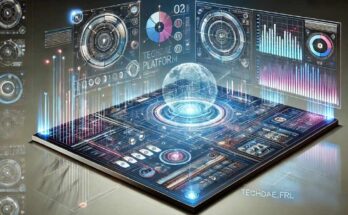In today’s world, technology is more than just a part of our lives—it drives change in nearly every sector. Whether it’s how we communicate, learn, work, or entertain ourselves, technology is reshaping how we experience the world. From the advent of artificial intelligence (AI) to advancements in renewable energy, the gift of technology is transforming our future in ways that were once considered unimaginable.
This article will explore how technology shapes various aspects of life and what the future holds.
Contents
The Rise of Artificial Intelligence
Artificial intelligence (AI) is one of the most profound technological innovations of recent times. It is already used in numerous industries, including healthcare, finance, retail, and manufacturing, to enhance efficiency, improve decision-making, and optimize processes. Machine learning, a subset of AI, allows computers to learn from data and make predictions or decisions without being explicitly programmed.
AI is used in the healthcare industry to diagnose patients, evaluate medical data, and even forecast their results. AI-driven technologies, such as robotic surgery and virtual health assistants, revolutionize patient care. In the business world, AI helps companies analyze customer behaviour, automate customer service, and optimize supply chains. As AI continues to evolve, its role in shaping the future will only expand, driving innovation across sectors and creating new opportunities.
The Internet of Things (IoT)
The Internet of Things (IoT) is a network of physical items with sensors, software, and other technologies implanted to gather and share data. IoT is making everyday objects brighter, from home appliances to transportation systems. Smart homes are becoming increasingly popular, with smart thermostats, lights, and security systems that can be controlled remotely via smartphones.
In transportation, IoT enables real-time tracking of vehicles, improving logistics and reducing traffic congestion. IoT is also transforming industries like agriculture, where farmers can monitor soil conditions, weather patterns, and crop health using IoT sensors. IoT’s interconnectedness makes industries more efficient, reduces costs, and improves productivity. As the number of connected devices continues to grow, the impact of IoT on our daily lives will continue to evolve.
Advancements in Renewable Energy
The future of technology is also closely tied to the advancement of renewable energy sources. As the world faces the challenges of climate change and environmental degradation, the shift toward renewable energy is becoming a priority. Solar, wind, and hydroelectric power are leading the way, and technology is crucial in making these energy sources more efficient and accessible.
Solar panels have become more affordable and efficient over the years, while wind turbines are becoming larger and more powerful. Technological advancements in energy storage, such as improved batteries, are helping to address the intermittent nature of renewable energy, ensuring that power can be stored and used when demand is high. Smart grids are also being developed to manage energy distribution better, allowing for a more sustainable and resilient infrastructure.
The shift to renewable energy is not just about combating climate change; it’s also about creating a more sustainable future for generations to come. The development of clean energy technologies creates new job opportunities, reduces fossil fuel dependency, and drives innovation in the energy sector.
The Transformation of Education
Technology is also revolutionizing the way we learn and access education. Online learning platforms, virtual classrooms, and digital tools are making education more accessible to people worldwide. Students can now take courses from top universities without ever setting foot on campus, and learning is no longer limited to traditional methods. Artificial intelligence creates personalized learning experiences, while virtual reality (VR) and augmented reality (AR) provide immersive educational experiences.
One of the most significant advantages of technology in education is its ability to bridge the gap between students worldwide. Online education platforms help students in remote areas access high-quality education and training, empowering them to pursue careers and opportunities they might not have had otherwise.
Furthermore, technology is helping to shape the future of work by providing people with the skills and knowledge needed to succeed in the digital age. Online learning, coding boot camps, and digital certifications are helping individuals acquire the skills necessary for jobs in tech, healthcare, and other emerging fields. As technology evolves, so will how we prepare for the future.
Healthcare Revolution
Technology has significantly improved healthcare, and the future promises even more exciting developments. Telemedicine has made healthcare more accessible, allowing patients to remotely consult with doctors and specialists. Wearable devices, such as fitness trackers and smartwatches, enable individuals to monitor their health in real time, providing valuable data that can help prevent illness and improve overall well-being.
In addition, advancements in biotechnology enable the development of personalized medicine, where treatments are tailored to the individual’s genetic makeup. This customized approach improves patient outcomes and reduces treatments’ side effects. CRISPR technology, a gene-editing tool, also shows promise in treating genetic disorders, opening up new possibilities for medical breakthroughs.
The future of healthcare will likely see even more technological innovations, including AI-powered diagnostics, robotic surgeries, and enhanced patient care through big data. With these advancements, healthcare will become more efficient, accessible, and effective in meeting the needs of a growing global population.
The Future of Work and Automation
Automation is one of the key trends shaping the future of work. From self-driving cars to automated manufacturing processes, robots and AI systems are increasingly taking over tasks that humans once performed. This shift is causing concern about job displacement and creating new opportunities for people with the right skills.
In industries like manufacturing, automation is improving efficiency, reducing human error, and lowering costs. Chatbots and virtual assistants are automating customer service in the service sector, allowing businesses to provide 24/7 support. However, automation is not just about replacing jobs—it’s also about augmenting human workers. Humans may concentrate on more complicated and creative work as AI and automation can handle repetitive jobs.
As automation becomes more widespread, the future of work will require individuals to adapt and develop new skills. The demand for jobs in technology, healthcare, and other sectors will continue to grow, and workers will need to be equipped with the knowledge and tools to thrive in a digital economy.
Conclusion
Technology has undoubtedly profoundly impacted the future, from healthcare and education to energy and work. The continued advancement of AI, IoT, renewable energy, and other technologies promises a future where efficiency, sustainability, and accessibility are prioritized. As we continue to harness the power of technology, it is crucial that we also address the challenges that come with it, such as job displacement and ethical considerations.
The gift of technology is a double-edged sword, offering incredible potential while presenting new obstacles to overcome. By embracing innovation and adapting to the changing landscape, we can ensure that technology continues to be a force for good, improving lives and creating a better future for all.
FAQ
1. How is technology affecting the workforce?
Technology automates routine tasks, which can lead to job displacement in some sectors. However, it also creates new job opportunities in AI, healthcare, and renewable energy. The future workforce must adapt by acquiring new skills that align with emerging industries.
2. How is artificial intelligence used in the medical field?
AI improves diagnoses, predicts patient outcomes, and optimizes treatments. It also enables the development of personalized medicine, where treatments are tailored to an individual’s genetic profile.
3. How is renewable energy shaping the future?
Renewable energy sources, such as solar and wind power, are reducing our reliance on fossil fuels and combating climate change. Technological advancements in energy storage and smart grids make renewable energy more efficient and accessible.
4. What is the Internet of Things (IoT)?
The Internet of Things (IoT) is a physically connected device network that gathers and shares data. It is transforming the healthcare, agriculture, and transportation industries by making them more innovative and efficient.



